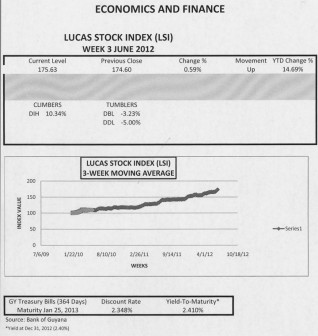Watchwords
In the 2012 budget presentation, the government talked about changing the way in which Guyanese would be educated, the manner in which business would be done, the way in which government services would be delivered and the way jobs would be created. These are goals that the government hopes to achieve some time in the future by eventually spending about $6 billion to create an enabling framework with the use of communication technology. Part of this process involves installing a high-speed fibre optic network from Lethem to Providence which will be used to deliver government services to the people of Guyana. When completed, the network would represent a major innovation in the method by which some government services are to be undertaken. The question at the back of many minds is will the new and different way of doing business lead to better governance? Answers to a question of that nature always default to issues of transparency and accountability. Therefore, it ought to come as no surprise if Guyanese expect the innovation referred to above to result in transparent and better governance, their watchwords for curbing corrupt practices and rejecting the discourtesy and unhelpfulness of some public servants.
Continuous revelation
There is a burning desire in Guyana to see the government operate differently and with greater openness. The continuous revelation that several contracts signed by the previous administration were fraught with difficulties or were not publicly disclosed to Guyanese continues to raise eyebrows. In the case of contracts already known to the public, it appears as if the details of many of the deals are still to be disclosed. Guyanese are increasingly becoming uncomfortable with the embarrassing revelation of transactions that violate the trust that they had placed in the previous administration to conduct the affairs of the country with fidelity. The discomfort exists despite the availability to Guyanese of consumer comforts such as computers, cell phones, internet service, and more transportation options that are consistent with a gradually changing society. In addition, there is little evidence that the provision and acquisition of some of those items and services were all the result of good governance. Based upon the findings of the Auditor-General and the research and analysis of many academics and public commentators, some of the wealth generated in Guyana in recent times could be linked to questionable practices and decisions of the last administration.
Equal access

Transparency is not only about achieving accountability in public spending. It is also about competitiveness. As often explained in Economics classes, for competition to work, those competing must have access to the same information. Even if competitors enter the market at different points in time and possess different skill levels, they must have equal access to the same information that was available to every other competitor. The value of competition is that it helps to bring down prices and make better products and services available to consumers.
Prejudicial product pricing
The government spends substantial amounts of money on capital investments and many government-sponsored projects are undertaken by private contractors. Evidence is emerging about prejudicial product pricing, something that undermines competition, which contradicts the assertion that the tender process was always transparent. To the extent that the tender process remains under suspicion, the work and wealth of private contractors will remain under suspicion. Those private business owners who were beneficiaries of political patronage under the last administration must be very uncomfortable with the new distribution of political power. This would be particularly true of businesses that were not exposed to investment risk because they were guaranteed contracts and prices as a result of political affiliation or personal relationships. Now that they were likely to be exposed to greater investment risk, they too might have a greater interest in seeing the emergence of a level playing field, now that their special advantages might be disappearing.
Bring down cost
The administration is turning to technology to bring about change. It is heartening to see that the drumbeat for change, especially the call to curb corruption, is getting louder and increasingly diverse.
At the individual level, Guyanese are looking to be treated better by public servants and to be able to see agreed systems work to reduce their dependence on the whims and fancies, and influence of a single individual. Affected by similar attitudes and conditions, companies are looking for improvements in the bureaucratic handling of import and export transactions and fairness in the implementation of the many regulations in general.
Technology, when applied properly, is known to lead to efficiency and increased productivity. Whether in the public sector or the private sector, it can bring down the cost of doing business and enhance the return on investments. This latter point should be of particular interest to the administration since it is the largest spender on large-scale projects with multi-year implementation cycles and therefore with the greatest potential for waste, fraud and abuse.
Culture
The technological innovations that are on the way would certainly help. Many believe that governments work well when they are transparent. Technology has changed positively the lives of many and raised the hopes and aspirations of others. Yet, it is no panacea for solving problems induced by bad public policy and inappropriate public practices. As one speaker observed at a forum on accountability sponsored by the Council on Foreign Relations (CFR), transparency is not about technology, it is about culture. So, unless there is an effort to change the attitude of public servants towards their jobs and the public they must serve, the administration would have wasted another $6 billion of taxpayers’ money on its innovations.








